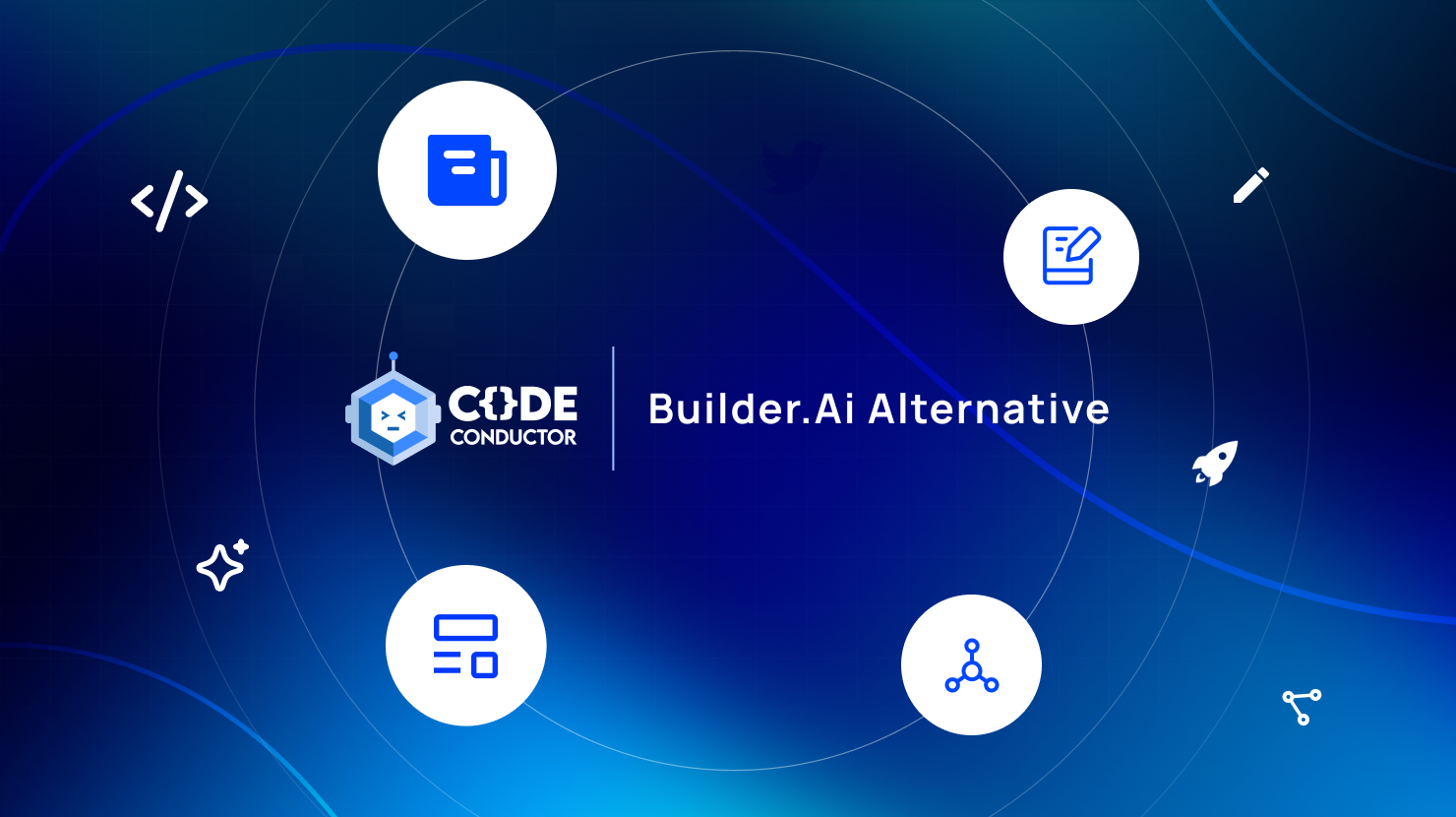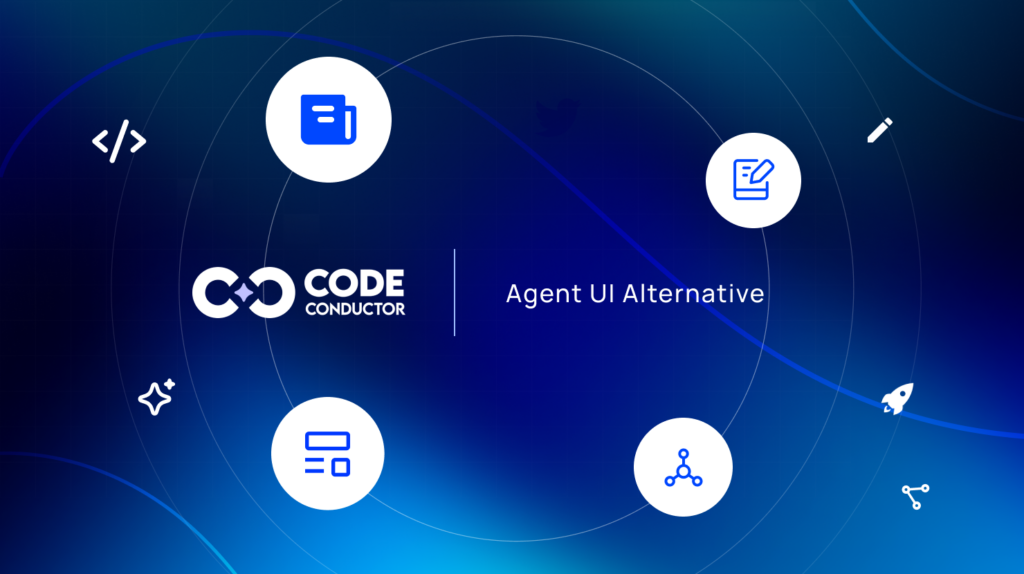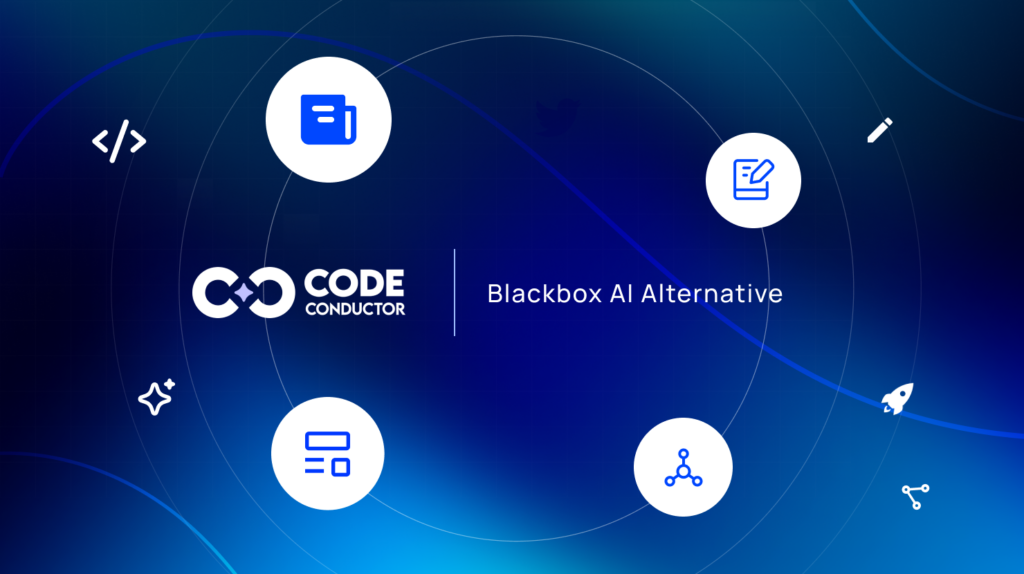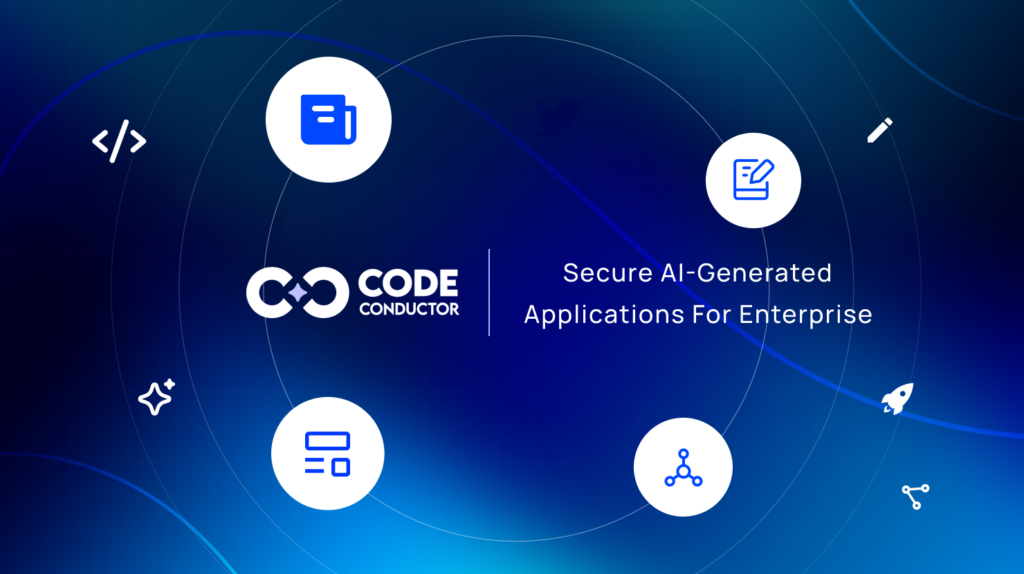Summarize at:
Is your team using Builder.ai (formerly Engineer.ai) but running into issues with real AI workflows, persistent memory, or secure deployment pipelines?
That’s a common experience for teams outgrowing no-code platforms that promise AI but don’t deliver when it’s time to scale.
Builder.ai has made headlines with its billion-dollar valuation and bold claims. But between its recent insolvency filing and growing concerns over its actual AI capabilities, many teams are now looking for a transparent, production-ready replacement.
That’s where CodeConductor.ai comes in.
CodeConductor isn’t just an alternative to Builder.ai – it’s a rebuild from the ground up. Everything Builder.ai aimed for, CodeConductor delivers, with real AI-native architecture, intelligent automation, multi-agent state retention, and complete DevOps integration. It’s what teams need when the prototype turns into a platform – when control, transparency, and scale really matter.
In This Post
- What Is Builder.ai?
- Why CodeConductor.ai Is the Best Builder.ai Alternative?
- Builder.ai vs. CodeConductor.ai – Feature-by-Feature Comparison
- Builder.ai vs. CodeConductor.ai – Which Tool Should You Use?
- Real Feedback on CodeConductor.ai
- Real Feedback on Builder.ai
- In a Nutshell: Choosing the Best Builder.ai Alternative
- FAQs About the Best Builder.ai Alternative – CodeConductor
- What is the best alternative to Builder.ai?
- Why switch from Builder.ai to CodeConductor?
- Can I migrate my app from Builder.ai to CodeConductor.ai?
- Does CodeConductor support cross-session memory for apps?
- Can non-technical founders use CodeConductor?
- Is CodeConductor suitable for building SaaS products?
- What makes CodeConductor better than Builder.ai?
- Top AI Platform Alternatives You Shouldn’t Miss in 2026
What Is Builder.ai?
Builder.ai launched in 2016 as a no-code/low-code app development platform, claiming to use artificial intelligence to help users build mobile and web applications quickly. Backed by over $450M in funding, Builder.ai emphasized:
- Automated UI + backend generation
- Drag-and-drop interfaces
- Industry-specific app templates
- AI-supported cost estimators
- Integrated cloud deployment
However, in May 2025, Builder.ai entered insolvency, following high-profile CFO and CEO resignations, and allegations of AI misrepresentation and inflated revenues.
Where Builder.ai Falls Short?
- Unverified AI capabilities – Most automation was outsourced or template-based; limited real-time LLM logic.
- No memory or agent support – Apps built with Builder.ai lack context awareness, persistent state, or cross-session logic.
- Opaque tech stack – Customers receive apps with little control over backend logic or DevOps access.
- Security & compliance issues – No enterprise-grade CI/CD, role control, or auditability.
- Financial instability – As of mid-2025, Builder.ai ceased operations amid insolvency filings and lawsuits.
Why CodeConductor.ai Is the Best Builder.ai Alternative?
Builder.ai promised AI, but lacked foundational features like memory, logic orchestration, and devops transparency. In contrast, CodeConductor.ai is a real AI-backed no-code software development platform, engineered for modern teams building intelligent applications.
Key Differences
- AI-Native Stack Built on LLMs: CodeConductor leverages state-of-the-art language models (LLMs) like GPT-4 to let developers build UI, backend logic, and workflows using natural language instructions. This enables true AI-generated software development, not templated drag-and-drop UIs.
- Persistent Memory and Cross-Session Intelligence: Unlike Builder.ai, which lacks memory, CodeConductor integrates long-term memory across users and sessions. Build apps that remember context, adapt dynamically, and evolve.
- Multi-Agent Workflow Engine: Deploy multi-agent systems with shared memory, goal-based coordination, and role-specific behaviors. This unlocks advanced AI use cases like smart assistants, autonomous bots, and dynamic workflows.
- Transparent DevOps with CI/CD Support: CodeConductor provides audit logs and full CI/CD pipelines, offering enterprise-grade governance that Builder.ai never implemented.
- Deployment Freedom & Code Ownership:Choose self-hosting, cloud deployment, or Docker-based delivery, while retaining full control over source code. Every application is transparent, modular, and production-ready.
Builder.ai vs. CodeConductor.ai – Feature-by-Feature Comparison
| Feature | Builder.ai | CodeConductor.ai |
|---|---|---|
| AI-Powered App Building | Template-driven, limited AI | Full-stack LLM-powered generation |
| Persistent Memory | ❌ | ✅ Built-in and session-aware |
| Multi-Agent Architecture | ❌ | ✅ Intelligent agent orchestration |
| DevOps + CI/CD | ❌ No transparency | ✅ CI/CD + audit logging |
| Code Ownership | ❌ Restricted backend | ✅ Transparent, exportable code |
| Hosting Flexibility | Cloud-only | Cloud, self-hosted, container-ready |
| Financial Viability | Insolvent as of 2025 | Profitable, stable, founder-owned |
Builder.ai vs. CodeConductor.ai – Which Tool Should You Use?
Builder.ai May Be Suitable If:
- You only need a quick MVP with generic templates
- You don’t require memory, logic, or full-stack control
- You’re okay with proprietary delivery pipelines
⚠️ Important Note:
As of May 2025, Builder.ai has entered insolvency following multiple investigations into fraudulent AI claims, inflated revenue reports, and executive resignations. The platform is currently unavailable for new or existing users, and its future remains uncertain. Teams relying on Builder.ai may face long-term disruption, data loss, and unfulfilled delivery contracts.
Choose CodeConductor.ai If:
- You need intelligent agents, persistent memory, and API orchestration
- You require production-grade CI/CD, RBAC, and audit trails
- You value control, ownership, and deployment freedom
Real Feedback on CodeConductor.ai
Code Conductor Important tool – ⭐️⭐️⭐️⭐️⭐️ 5/5
What do you like best about CodeConductor?
The code of conduct is used by my company for a series of behaviors to be observed towards colleagues and customers, it is very useful to understand all the regulations in your countryWhat do you dislike about CodeConductor?
It helped me on how to behave with a customer, what to say and not say to colleagues so as not to offend their sensitivity and avoid problems of incorrect conductWhat problems is CodeConductor solving and how is that benefiting you?
Helps with how certain corporate affairs should be resolved, such as managing corporate agreements with very important clients, avoiding making legal mistakes and getting into disputes with the country they belong to.
CodeConductor users consistently cite transparent architecture, AI depth, and enterprise support as decisive advantages.
Real Feedback on Builder.ai
Frustrating horrible experience – ☆☆☆☆☆ 0/5
What do you like best about Builder.ai?
Nothing. We started off well then the journey became tough.What do you dislike about Builder.ai?
I’ve had a deeply frustrating horrible experience with Builder.ai. The team consistently failed to meet delivery timelines and struggled to resolve even basic issues. Their lack of technical capability has caused significant delays and disappointment. Unfortunately, after repeated setbacks, I’ve reached the point where I can no longer continue with their service. Do not recommend this platform at all.What problems is Builder.ai solving and how is that benefiting you?
it is not benefitting us at all. We are losing money.
In a Nutshell: Choosing the Best Builder.ai Alternative
If your team needs simple app templates, limited workflows, and fast no-code prototyping, Builder.ai might offer a short-term solution. It’s designed for quick launches, but lacks transparency, memory, and deep integration with AI logic.
But when your ambitions grow, when you need AI agents that remember context, coordinate across tasks, adapt over time, and deploy securely at scale, CodeConductor.ai is the platform built to grow with you.
Builder.ai is best for:
- Basic MVPs using pre-set templates
- Teams without long-term memory or agent requirements
- Projects that don’t need devops or CI/CD governance
CodeConductor.ai is best for:
- Persistent, multi-agent systems with memory and logic branching
- Enterprise workflows need RBAC, audit logs, and deployment control
- Developer-led teams building production-grade AI infrastructure
If you’re running into the limits of Builder.ai, or can’t risk another blackout from platform instability, switch to a solution that’s built for intelligent scale: CodeConductor.ai
FAQs About the Best Builder.ai Alternative – CodeConductor
What is the best alternative to Builder.ai?
CodeConductor.ai is the best Builder.ai alternative. It offers persistent memory, intelligent agent workflows, CI/CD integration, and full source code ownership – key capabilities that Builder.ai lacks.
Why switch from Builder.ai to CodeConductor?
Builder.ai has faced insolvency, lacks persistent memory, and limits code access. CodeConductor solves these with transparent logic, agent-based design, and enterprise-ready deployment tools.
Can I migrate my app from Builder.ai to CodeConductor.ai?
Yes. You can recreate your project on CodeConductor.ai using natural language prompts and gain full control of backend logic, agents, and memory—all without vendor lock-in.
Does CodeConductor support cross-session memory for apps?
Yes. CodeConductor supports persistent memory, allowing apps and bots to recall data and actions across sessions – something Builder.ai does not offer.
Can non-technical founders use CodeConductor?
Absolutely. CodeConductor offers a natural language UI, template support, and guided onboarding – perfect for founders without a technical background.
Is CodeConductor suitable for building SaaS products?
Yes. CodeConductor is designed for AI-native SaaS development, enabling full lifecycle management from logic building to deployment, security, and scaling.
What makes CodeConductor better than Builder.ai?
CodeConductor delivers transparent architecture, intelligent memory, agent coordination, and full dev workflows – features absent from Builder.ai’s no-code templates.
Best Builder.ai Alternative – Try it Free
Top AI Platform Alternatives You Shouldn’t Miss in 2026
Share at:

Founder CodeConductor






